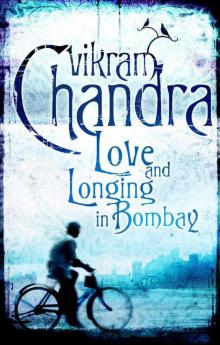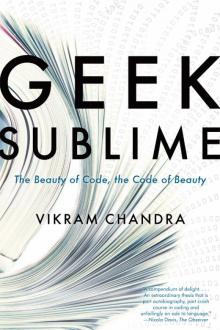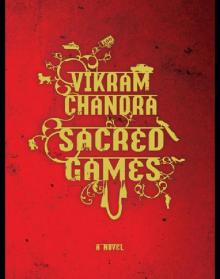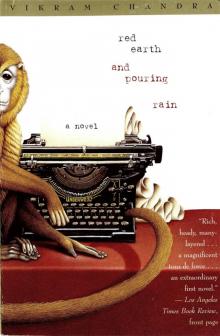- Home
- Vikram Chandra
Sacred Games Page 12
Sacred Games Read online
Page 12
At Siddhi Vinayak he said goodbye to Ma, and settled back into the seat, smiling. It was good to look forward to the trip to Pune. A crowd swirled around the entrance to the Siddhi Vinayak lane, a host of worshippers bringing their entreaties and supplications and gratitude. The temple rose to its golden spire, carrying its huge symmetries easily to the sky. Sartaj wondered if Ganesh Gaitonde had some other place where he went to from the city, some town or village he called his native place. He would ask Katekar.
Ganesh Gaitonde had said something about God and belief at the end. By now Gaitonde would know for sure whether there was a God to believe in, or not. Sartaj didn’t particularly care about Gaitonde’s soul, but he knew it was time to go and look at his body, his and the dead woman’s. He had been avoiding it, but he would have to go. Sartaj cursed Ganesh Gaitonde, and drove on.
The next morning, Katekar protested about the visit to Gaitonde, as Sartaj had expected. The man was dead, Katekar said, and he and the woman would remain dead, so there was no need to go near them now, none at all.
‘You can stay outside,’ Sartaj told him. ‘But you should be used to dead bodies by now.’
The morgue was an ancient sandstone building, pitted and stained but still handsome with its tall arches and flowery stonework. It stood, green-shaded, under a huge banyan tree at the rear of KD Hospital. Sartaj dropped Katekar off at the gate of the hospital, drove around the building and parked near a paan-stained wall. For all his rationalism, Katekar had a horror of the morgue, its doctor and attendants, the emerald light under the banyan tree. He said the whole place smelt, that he could smell it from across the hospital compound, that there was a yellow miasma that slid into your clothes and sank into your pockets and stayed. Sartaj rather enjoyed this unexpected upsurge of superstition deep within the stolid frame of Ganpatrao Popat Katekar, man of science. It gave Sartaj something to point to when Katekar affected a superior sneer at Sartaj’s various romanticisms.
Sartaj went past the enquiry window, with its small cluster of anxious men who had come looking for missing relatives and friends. He went down a dark corridor and through the double glass doors marked ‘No Entrance’. An attendant in brown shorts and shirt sat behind a scratched metal desk, under muzzy tube-lights. He salaamed Sartaj, who took a deep breath, blinked once and went through another pair of swinging doors, of green-painted wood this time. The room on the other side was quite large, big as a good-sized wedding hall, well-lit from two square skylights and two rows of tube-lights. The floor was smooth brown stone, sloping inwards to a square drain. There were two brown bodies, both male, naked on the stone tables to the left. The top of the far one’s skull had been removed, with a precise round cut that made him a cartoon character whose head had come unscrewed. His brain sat in a tidy grey mound on a tray next to his elbow. And here, on the right, was Dr Chopra, analyst at the abyss, working efficiently. He was scooping out intestines into a large tray. Sartaj turned his head away.
‘Dr Chopra?’
‘Ah, Sartaj. Wait, wait.’
Sartaj watched the wall, followed the cracks in the grey plaster up to the ceiling and then back down again. And then the rusted bars on the closed window, he counted them and examined their thickness. Meanwhile there were small sucking sounds to his right, and a little wet grinding. The first of the many times Sartaj had come in here, into Dr Chopra’s dissection house, he had made himself look, on the principle that a policeman must gaze steadfastly at everything, anything, what the world is truly made of, you must know it all unflinchingly, without repugnance or perverse fascination. And he had seen what Dr Chopra had exposed, had been able to look at it, and it wasn’t that horrifying after all, just the complicated inner clockwork of the body, a fluid machinery possessed of an intricate, severe harmony. But the surfaces of the corpses followed him and stayed with him into his sleep, the light ring of skin on the third finger of a fisted hand, the tribal tattoo on a woman’s chin, the crimson flecks of lipstick on a lower lip, faint but unmistakable. He accumulated fragments of the dead, tiny memories of their lives that cost something to carry, and finally he decided he no longer had a young man’s pride, that he would save his will for work, for his own cases. So he no longer looked.
‘Done,’ Dr Chopra said.
Sartaj heard the snap of rubber gloves, and he turned, keeping his head tilted up. He saw the dead man’s face, and stared for a moment. Then he saw the thick thatch of Dr Chopra’s hair. The doctor was the hairiest man Sartaj had ever met. It was just past twelve, and Dr Chopra’s cheeks and jaw were already shaded dark, and there was a thick black mat of hair that came up from his chest, half-way up his neck. He was washing his hands in a basin.
‘Doctor saab,’ Sartaj said, ‘I need to see Gaitonde and his female friend.’
‘Fine,’ said Dr Chopra. ‘They’re in the cold room.’
‘Post-mortem done already?’
‘Arre, Gaitonde was a big bhai, yes? He and his friend got jumped ahead in the queue.’ Dr Chopra laughed, and it was quite genuine, full of pleasure. ‘You want me to get the boys to haul them out of the cold room? Quicker if we go there.’
There was a challenge in his stance, in the raising of his bushy, overhanging eyebrow: if you can take it, Mr Policeman. The cold room was what Katekar absolutely hated. He had been inside only once, when he and Sartaj had been looking for the body of a khabari. Katekar had stepped into the cold room, put a hand to his mouth and turned and walked out, walked out to the banyan tree. Sartaj had stayed inside and found the body they were looking for. Sartaj had done it before, he could do it now. He shrugged. ‘Cold room is fine.’
A shaded walkway led to the cold room, through the obliterating afternoon glare. Sartaj squinted, and walked, and now there was no avoiding the smell. They passed through a door, into a long dark passageway, and it pressed up against his cheeks. The windows were closed against the heat, against the throbbing of the sun, and the air inside the entryway was engorged with the ripe, round exhalations from the two rows of bodies stacked against the walls, in sheets on double racks. The sheets were damp and the ground below the racks was slimy, slick.
Sartaj nodded at the attendants sitting at the desk at the end of the corridor. He could feel a hiccup curling itself at the back of his throat, and he didn’t want to open his mouth.
‘Inspector saab,’ one attendant said, rising. ‘After a long time.’ He had been reading a Hindi novel, and his friend was writing a letter. They both stood up.
Sartaj spoke carefully, enunciating. ‘It smells worse than last time,’ he said as he went past the desk.
‘Arre, saab,’ the attendant with the novel said, ‘wait until the air-conditioners break again. Then you’ll really smell something.’
‘Wait until it rains and the leaks start coming through the walls,’ the other one said with large satisfaction. ‘Then you’ll really have fun.’
There is a certain pleasure we take in thinking about how bad it gets, Sartaj thought, and then in imagining how it will inevitably get worse. And still we survive, the city stumbles on. Maybe one day it’ll all just fall apart, and there was a certain gratification in that thought too. Let the maderchod blow.
Dr Chopra nodded at his attendants. The door to the cold room was shiny steel, very sleek and new and promising high technology and sterility. The fiction-reading attendant touched the heavy door-handle, touched his throat and mouthed a mantra. He grabbed the handle and leaned back, and the door swung open. ‘Come,’ Dr Chopra said.
And inside there were the jumbled rows of bodies that Sartaj remembered. They lay naked on the tiled floor, jammed up against each other, shoulder to shoulder, shoulder over shoulder, from one side of the long room to the other. Each was stitched up the front, in broad looping knots in thick black thread, where the long incision had been made for the post-mortem. Rusty, dark skin, gone as densely opaque as mud, spiky, petrified pubic hair. Sartaj was thinking, it’s not really cold in here. They call it a cold room but there are res
taurants that are colder, the upstairs room of the Delite Dance Bar is colder. He could hear the dull, halting rush of the air-conditioner.
‘Ladies are over here,’ Dr Chopra said.
In this charnel, past all carnality, the decencies were preserved. The ladies were piled on top of each other in a kind of small cabin to the left, with its own metal door. The attendants reached in and shifted the bodies around, tugged and pulled, and something knocked on the door and made a happy bonging. Sartaj found himself concerned with the attendants’ hands, they’re handling all that without gloves, he hoped they washed their hands afterwards.
‘Saab,’ the letter-writer said. They had found her.
Sartaj stepped back. His shoes were sticking to the floor.
There was the usual long incision up her front. Her lips had turned the cracked pale blue of old candles, and had drawn back from her upper teeth. The autopsy photo in the file had flattened out her cheekbones, and had made invisible the sharp nose. But the nose had been broken once, there was a small dent in it. In death she was plain, but there was muscle on her shoulders and along her flanks, and Sartaj saw her in a dancer’s jaunty stance, glowing and proud of her figure.
‘Unknown female deceased,’ Dr Chopra read from a long sheet. ‘Five foot three and a half inches, 110 pounds, black hair to shoulder length, eyes black, four-inch scar on right knee, had last eaten about eight hours prior to death, cause of death single gunshot trauma to sternum, bullet passed upwards at an angle and exited at T4, causing extensive damage to lungs, spinal cord. Death was instantaneous.’
Instantaneous death. Sartaj wondered if she had seen it coming, the raised barrel and Gaitonde’s reddened eye above. ‘No distinguishing marks besides the scar?’
‘None.’
‘All right,’ Sartaj said. Sometimes the body of the deceased taught you things that you didn’t know before, but this had been a short history. She was unmarked by life, mainly.
‘And Gaitonde?’ Dr Chopra said, turning.
‘Gaitonde. Yes.’
Sartaj followed Dr Chopra down the room, in the small lane between the bodies. There were flows of liquids across the floor, light albumen runs and thick blackish discharges. Sartaj carefully placed one foot, then the other. Gaitonde lay in the middle of a row, indistinguishable from the others but for the ruin of his head. The exposed inner flesh had turned black. ‘Five foot six, 151 pounds, he’s survived two bullet wounds.’ Dr Chopra pointed. ‘Interestingly enough, one was in his buttocks. The great Gaitonde must have been running when he got that one. The other wound was in his left shoulder, here.’
Sartaj bent over Gaitonde, and saw that he had a fine profile, with a noble brow. He was born to be a king, Sartaj thought, or maybe a sage. He must have looked in the mirror and wondered what he would become.
Dr Chopra was stroking the hair on the back of his right hand. An air-conditioner kicked itself on with a low rumble, and the fetid smell surged up from Gaitonde and the rest of them. ‘Thanks, doctor saab,’ Sartaj said, and he had had enough. He straightened and went, going fast. He turned sideways to go past the attendants, who were lifting the female deceased back through the cabin door. He went by them. Light seeped through the angles of the main doorway, and in the brightness Sartaj saw on the floor a tattered rind of black flesh, a small piece of jaw attached to three teeth. He stepped over it and fled into the sunlight.
‘Are you all right?’ Dr Chopra said.
Sartaj was standing by the banyan tree, one hand on its grainy bark, breathing. ‘Why can’t you keep that gaandu place cold? Why?’
‘The air-conditioners break down, the wiring is old and the fuses blow, and the population is too large. The morgue is too small.’
Yes, it was unfair to blame the good Dr Chopra. It was in no way his fault, that there wasn’t enough money, too little electricity, too small a space and far too many dead. ‘Sorry, Doc,’ Sartaj said. He made a large gesture in the air, an awkward movement that took in everything. Dr Chopra nodded and smiled. ‘Thanks,’ Sartaj said.
‘I hope seeing them was useful.’
‘Yes, yes. Very useful.’ Sartaj said this, but as he was walking to the jeep he wasn’t sure. Now the desire to see the bodies, which only a little while ago had seemed so coherent, seemed bizarre. What had he learnt? Sartaj had no idea. It had all been a waste of time. He was eager to be away, back at the station, but at the jeep he found himself unable to get in. He stepped over a border made of painted half-bricks into what was left of a garden, found a patch of dead brown grass and wiped the bottom of his shoes, rubbed them back and forth on the grass until the stalks broke with small clicking sounds and his grinding heart settled and calmed.
Shalini was cooking by the time Katekar got home. She cleaned at a doctor’s house in Saat Bungla, but at only one house, unlike some others who had three jhadoo-katka jobs, or four. It was good to have the money from the doctor, but they had decided that she needed to be home when the boys came in, at home in the afternoons and early evenings so they could feel her presence and she could keep an eye out. But the money was very welcome. And it was good to know a doctor with a clinic, for times of special need. Katekar put down his mat and pillow. Shalini was cooking, and he liked the stir of her motions, they lulled him, the tinkle of the spoons, the flurrying back-and-forth rush of the knife, the fast bubbling of the flames on the stove, the leaping sizzle when she flung in a fistful of goda masala. He was comfortable, with the quiet stirring of air from the table-fan set on ‘Low’. He napped easily in the day, stored sleep like a camel hoarded water. In the life of a constable, this was necessary. He took a long breath.
When he awoke it was dark inside the kholi, and there was the bustle of evening in the lane outside. He turned his wrist, and it was six-thirty. ‘Where are the boys?’ he said. He didn’t need to turn his head to know Shalini was sitting in the doorway.
‘Playing,’ she said.
He sat up, rubbed his eyes. The stove rattled as she pumped it, and then he saw her face, suddenly bronzed out of the shade. ‘They’re fighting,’ he said, and he didn’t need to say that he didn’t mean the boys.
‘Yes.’ Amritrao Pawar and his wife Arpana lived two kholis down, and they had been fighting continuously, as nearly as their neighbours could tell, for eleven years. Four years after their marriage, Pawar had acquired another woman. Arpana had left, gone back to her parents, and had been reassured that it was merely a passing thing, that Pawar had quit the other woman, and that it was all over. She had come back, but then the other woman had had a child, and now Pawar maintained two establishments. He and Arpana refused to part, refused to come closer or divide, they fought and fought. For Arpana’s neighbours, the other woman was still the other woman, Arpana had not called her by name in eleven years, and Pawar never spoke about her.
Katekar and Shalini drank their tea seated across from each other. She had the kaande pohe he liked on a plate between them. ‘I spoke to Bharti yesterday.’
Bharti was her younger sister, who was married to a scrap-metal dealer in Kurla. There was apparently much money in scrap metal, because Bharti always came to visit in a new sari. Last year, she had come the day before Gudi-Padwa, wearing new gold bangles of a conspicuous thickness and glow, and bearing not only batasha garlands but also large, fragrant boxes of puranpoli and chirote for the boys. Katekar had watched his sons lick their glistening, sweet fingers, and he had watched his wife’s face as she had put away the boxes and the new sari for herself, and he had marvelled at how generosity can be the subtlest of all weapons, and especially between sisters. So now he took a long sip of his tea. ‘Yes?’ he said.
‘They’re buying the next kholi also,’ Shalini said.
‘In the chawl?’
‘Where else?’
The retort had come quick and sharp, and she was not backing down from his quizzical look. So now her sister and brother-in-law would tear down walls, combine rooms, have a home that was expansive enough to contain their sense
of themselves. ‘They have three children,’ Katekar said. ‘They need the space.’
Shalini snorted and picked up the plate of biscuits. ‘What, those little taporis need a palace to live in?’ She got up and began to gather spoons, rattle the bowl about. ‘Bharti has been a wastrel since she was this high. Those two never think about the future. Their children will turn out bad, you wait and see.’
She loved her nieces and nephew, smothered them with hugs and unbent more with them than with her own sons, and Katekar knew this well. So he put on his shirt, drew on his pants. She had the pot scoured and hung up already. Katekar grinned at her. ‘I heard a joke yesterday,’ he said.
‘What?’
‘Once Laloo Prasad Yadav met some Japanese businessmen who had come to Bihar. The Japanese businessmen said to him, “Chief-minister-ji, your state has great resources. Give us a free hand for three years and we’ll turn Bihar into the next Japan.” Laloo looked very surprised. He said, “And you Japanese are supposed to be efficient! Three years? Give me a free hand for three days and I’ll turn Japan into the next Bihar.’’’
‘Not very funny.’ But she was smiling.
‘Arre,’ Katekar said, ‘your family just never had a sense of humour.’
This was a theme they had explored for years: his family was extravagant but fun-loving, hers was thrifty but boring. Variations on this theory took in the boys, Rohit had gone on Katekar, Mohit on his mother. Now Shalini was thinking of her sons. ‘Will you be done early enough to stop at Patil’s?’
Patil was the tailor who had a shop two lanes down, tucked into a long narrow building that stood on what had once been a broken wall and an unused gutter. Patil had filled in the gutter, closed off the rear, put on a roof, and now he sat two full-time tailors at sewing machines. He made uniforms for the boys, good ones, strong enough that Mohit could wear what Rohit grew out of. ‘Not today,’ Katekar said. ‘I’ll pick it up tomorrow. One half-pant, one shirt, yes?’

 Love and Longing in Bombay
Love and Longing in Bombay Geek Sublime
Geek Sublime Sacred Games
Sacred Games Red Earth and Pouring Rain
Red Earth and Pouring Rain